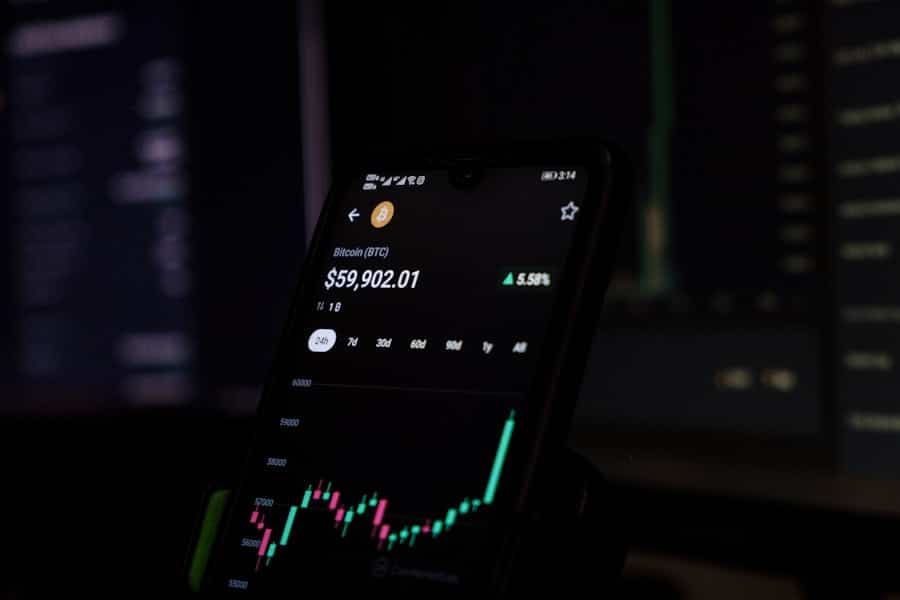Digital finance has emerged as a transformative force in various sectors, and its influence on carbon markets is particularly noteworthy. Carbon markets, which facilitate the trading of carbon credits to offset greenhouse gas emissions, are increasingly integrating digital financial tools to enhance efficiency and accessibility. The intersection of digital finance and carbon markets is not merely a trend; it represents a fundamental shift in how environmental assets are valued, traded, and regulated.
Moreover, digital finance introduces innovative financial instruments that can enhance liquidity in carbon markets. For instance, tokenization of carbon credits allows for fractional ownership, enabling smaller investors to participate in carbon trading.
This democratization of access is crucial for fostering a more inclusive market where diverse participants—from large corporations to individual investors—can contribute to climate action. As digital finance continues to evolve, its role in carbon markets will likely expand, driving greater engagement and investment in sustainable practices.
Key Takeaways
- Digital finance plays a crucial role in facilitating transactions and enabling access to carbon markets, making it easier for participants to engage in carbon trading.
- Using digital finance for carbon trading offers advantages such as lower transaction costs, faster settlement times, and increased accessibility for a wider range of participants.
- Blockchain technology is revolutionizing carbon markets by providing a secure and transparent platform for tracking and verifying carbon credits, reducing the risk of fraud and double counting.
- Digital finance has a significant impact on increasing transparency and accountability in carbon trading, as it allows for real-time tracking and reporting of transactions, enhancing trust and credibility in the market.
- The potential for digital finance to increase participation in carbon markets is significant, as it can attract new investors and enable smaller players to enter the market, leading to greater liquidity and efficiency.
- Implementing digital finance in carbon markets comes with challenges and risks, including cybersecurity threats, regulatory compliance, and the need for technological infrastructure in developing countries.
- Case studies of successful implementation of digital finance in carbon trading demonstrate its effectiveness in streamlining processes, reducing costs, and increasing market participation, leading to more efficient and transparent carbon markets.
- The future of digital finance in supporting global carbon markets looks promising, with continued advancements in technology and increasing adoption of digital platforms, paving the way for a more sustainable and efficient carbon trading ecosystem.
Advantages of Using Digital Finance for Carbon Trading
The advantages of employing digital finance in carbon trading are manifold, significantly enhancing the operational dynamics of these markets. One of the primary benefits is the increased efficiency in transaction processing. Traditional carbon trading often involves cumbersome paperwork and lengthy approval processes, which can delay transactions and increase costs.
Digital finance streamlines these processes through automated systems and smart contracts, which execute trades instantly upon meeting predefined conditions. This not only accelerates the trading process but also reduces the potential for human error, ensuring that transactions are executed accurately and promptly. Additionally, digital finance enhances market accessibility.
By utilizing online platforms and mobile applications, participants can engage in carbon trading from virtually anywhere in the world. This geographical flexibility opens up opportunities for a broader range of participants, including those from developing countries who may have previously been excluded from such markets due to high entry barriers. Furthermore, the use of digital wallets and cryptocurrencies can facilitate cross-border transactions without the need for traditional banking systems, thus lowering transaction fees and making carbon trading more economically viable for smaller entities.
How Blockchain Technology is Revolutionizing Carbon Markets

Blockchain technology stands at the forefront of the digital finance revolution within carbon markets. Its decentralized nature ensures that all transactions are recorded transparently and immutably on a public ledger, which significantly enhances trust among market participants. In an industry where verification of carbon credits is paramount, blockchain provides a robust solution by enabling real-time tracking of carbon credits from their issuance to retirement.
This traceability helps prevent issues such as double counting or fraud, which have historically plagued carbon markets. Moreover, blockchain facilitates the creation of decentralized autonomous organizations (DAOs) that can govern carbon trading platforms without centralized control. These DAOs can implement rules and protocols that ensure fair trading practices while allowing stakeholders to participate in decision-making processes.
For example, projects like Climate Ledger Initiative are exploring how blockchain can be used to create a more efficient and transparent carbon market ecosystem. By harnessing the power of blockchain, stakeholders can foster greater collaboration and innovation in addressing climate change challenges.
The Impact of Digital Finance on Transparency and Accountability in Carbon Trading
Transparency and accountability are critical components of effective carbon markets, and digital finance plays a pivotal role in enhancing both aspects. The integration of digital financial tools allows for real-time monitoring of carbon credit transactions, providing stakeholders with immediate access to data regarding credit issuance, trading volumes, and market prices. This level of transparency not only builds trust among participants but also empowers regulators to enforce compliance more effectively.
Furthermore, digital finance enables the implementation of advanced analytics and reporting tools that can assess the environmental impact of carbon trading activities. By utilizing big data analytics, stakeholders can evaluate the effectiveness of their investments in carbon credits and make informed decisions about future purchases or sales. This data-driven approach fosters accountability as participants are held responsible for their contributions to emissions reductions.
As a result, digital finance not only enhances operational transparency but also encourages a culture of responsibility within carbon markets.
The Potential for Digital Finance to Increase Participation in Carbon Markets
One of the most promising aspects of digital finance in carbon markets is its potential to broaden participation among diverse stakeholders. Traditionally dominated by large corporations and institutional investors, carbon markets have often excluded smaller players due to high entry costs and complex regulatory frameworks. However, digital finance lowers these barriers by providing accessible platforms for trading carbon credits.
For instance, peer-to-peer trading platforms enable individuals and small businesses to buy and sell carbon credits directly without intermediaries. This model not only democratizes access but also encourages grassroots initiatives aimed at reducing emissions. Additionally, micro-investment opportunities facilitated by digital finance allow individuals to invest small amounts in carbon offset projects, thereby fostering a sense of ownership and engagement in climate action.
As more participants enter the market, the overall liquidity increases, leading to more dynamic pricing mechanisms and enhanced market stability.
Challenges and Risks of Implementing Digital Finance in Carbon Markets

Regulatory Uncertainty and Compliance
One significant concern is the regulatory uncertainty surrounding digital assets and blockchain technology. Different jurisdictions have varying regulations regarding cryptocurrencies and tokenized assets, which can create confusion for market participants seeking to navigate compliance requirements. This lack of uniformity may hinder cross-border trading and limit the scalability of digital finance solutions within global carbon markets.
Cybersecurity Risks and Data Protection
Cybersecurity risks pose a substantial threat to digital finance systems used in carbon trading. As transactions become increasingly digitized, they become vulnerable to hacking attempts and fraud. Ensuring robust security measures are in place is essential to protect sensitive data and maintain trust among participants.
Sustainability and Environmental Impact
Furthermore, the environmental impact of blockchain technology itself—particularly energy-intensive consensus mechanisms—raises questions about the sustainability of these solutions in the context of climate action.
Case Studies of Successful Implementation of Digital Finance in Carbon Trading
Several case studies illustrate the successful integration of digital finance into carbon trading frameworks, showcasing innovative approaches that have yielded positive outcomes. One notable example is the partnership between IBM and Veridium Labs, which developed a blockchain-based platform for tokenizing carbon credits derived from sustainable forestry projects. This initiative not only streamlined the verification process but also enabled investors to purchase fractionalized tokens representing specific amounts of carbon offsets.
By leveraging blockchain technology, this project enhanced transparency while providing a new revenue stream for conservation efforts. Another compelling case is the use of digital finance by companies like AirCarbon Exchange (ACX), which operates a fully regulated exchange for trading carbon credits using blockchain technology. ACX has successfully created a marketplace that allows participants to trade verified carbon credits seamlessly while ensuring compliance with international standards.
The platform’s innovative approach has attracted a diverse range of participants, from corporations seeking to offset their emissions to individual investors looking to support sustainable initiatives.
The Future of Digital Finance in Supporting Global Carbon Markets
Looking ahead, the future of digital finance in supporting global carbon markets appears promising as technological advancements continue to reshape the landscape. The ongoing development of decentralized finance (DeFi) applications could further enhance liquidity and accessibility within carbon markets by enabling innovative financial products tailored specifically for environmental assets. For instance, DeFi protocols could facilitate automated lending or staking mechanisms that incentivize participants to hold onto their carbon credits longer, thereby stabilizing prices.
Moreover, as awareness around climate change grows, there is likely to be an increase in demand for transparent and accountable investment opportunities in sustainability-focused projects. Digital finance can play a crucial role in meeting this demand by providing platforms that connect investors with verified carbon offset projects worldwide. As more stakeholders recognize the importance of integrating environmental considerations into their financial decisions, digital finance will undoubtedly become an integral part of the evolving landscape of global carbon markets.
In conclusion, while challenges remain in implementing digital finance within carbon markets, its potential benefits are substantial. By enhancing efficiency, transparency, and participation, digital finance stands poised to revolutionize how we approach climate action through innovative financial solutions that align economic incentives with environmental sustainability.
Digital finance is revolutionizing the way global carbon markets operate, providing innovative solutions to combat climate change. In a related article, Exploring the Features of the Samsung Galaxy Book Odyssey, the focus shifts to the latest technological advancements in the realm of laptops and how they are shaping the future of digital connectivity. Just as digital finance is transforming carbon markets, cutting-edge devices like the Samsung Galaxy Book Odyssey are reshaping the way we work and interact in a digital world.
FAQs
What is digital finance?
Digital finance refers to the use of digital technology to provide financial services, such as mobile banking, online payment systems, and digital currencies. It encompasses a wide range of financial activities that are conducted electronically.
What are global carbon markets?
Global carbon markets are systems that allow countries, companies, and other entities to buy and sell permits and credits that represent the right to emit greenhouse gases. These markets are designed to help reduce overall greenhouse gas emissions by creating financial incentives for entities to reduce their emissions.
How is digital finance supporting global carbon markets?
Digital finance is supporting global carbon markets by providing innovative solutions for tracking, trading, and managing carbon credits and permits. Digital platforms and technologies are being used to streamline the process of buying and selling carbon credits, making it easier for entities to participate in carbon markets and comply with emissions reduction targets.
What are some examples of digital finance solutions for global carbon markets?
Examples of digital finance solutions for global carbon markets include blockchain-based platforms for tracking and verifying carbon credits, digital payment systems for buying and selling credits, and online marketplaces for trading carbon permits. These solutions are helping to make carbon markets more efficient and accessible to a wider range of participants.
What are the potential benefits of using digital finance in global carbon markets?
The potential benefits of using digital finance in global carbon markets include increased transparency and accountability, lower transaction costs, and greater liquidity in the market. Digital finance solutions can also help to reduce the risk of fraud and improve the overall integrity of carbon trading systems.

